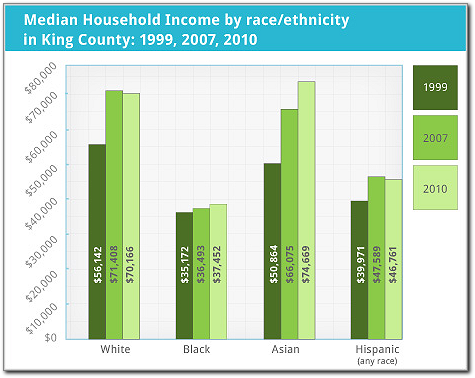Health Data Newsletter
February 2013
New data on our community's health
Welcome to Public Health - Seattle & King County's Health Data News, brought to you by our Assessment, Policy Development & Evaluation Unit. We hope that this occasional update of new developments with data, assessment, and evaluation will be useful to you in learning more about the health of our county's population, and how you can use data to shape your work. Our services include:
- Community assessment
- Data analysis
- Mapping
- Project and program evaluation
- Policy analysis and development
- Quality and performance improvement
Each issue of our update will feature new data and information of interest to our diverse King County community.
QuickStat: Life expectancy varies by where you live
Residents of south Auburn have a life expectancy of 76.7 years vs. west Bellevue residents at 86 years.
Life expectancy within King County can vary by almost 10 years depending on residence, even though life expectancy in King County (81.9 years) exceeds nationwide life expectancy (78.6 years).
[US and King County comparison data from 2010; King County neighborhood data from 2006-2010.]
City Health Profiles: New profile of community health
New City Health Profiles released in January provide information on health indicators and their determinants in 25 areas of King County. Some of these areas are a single city, some are a group of smaller cities, and some are unincorporated areas. For each of the 25 areas, the report includes seven sections:
- Demographics
- General health status
- Leading causes of death
- Health risk factors and chronic diseases
- Injury and violence-related mortality
- Maternal and infant health
- Access to care and preventive services
Communities Count: Countywide report on health and other indicators features interactive data
Communities Count, King County's public-private partnership with the United Way, Seattle Foundation and other local community leaders, recently launched a new website. According to Communities Count analyses, income inequity by race and ethnicity persists in the region. The assessment shows that:
- A year and a half after the recession technically ended, income had not grown significantly for any racial/ethnic group in King County as of 2010.
- Even in the pre-recession boom years of 1999 to 2007, income for African Americans in King County did not increase appreciably.
Communities Count integrates Community Health Indicators, other data, and qualitative interviews with community members to create a compelling picture of our community's basic needs, health and well-being. Communities Count features interactive data and a series of rolling updates to allow a real-time picture of how well we are doing. Recent updates include a focus on families, food, income, housing, and overweight/obesity status. Coming soon: updates on alcohol, tobacco, physical activity, stress, "enriching activities," teen births, infant mortality, and childhood health risks.

 Translate
Translate
